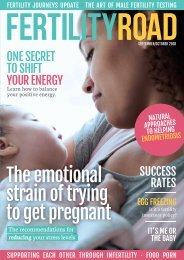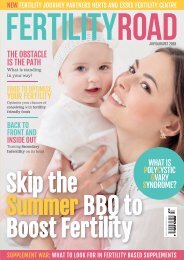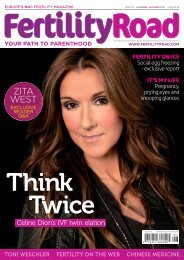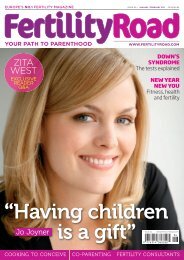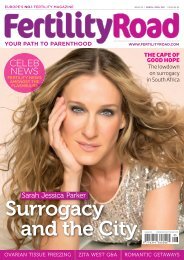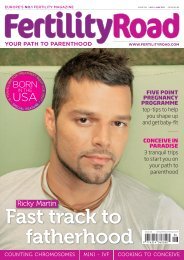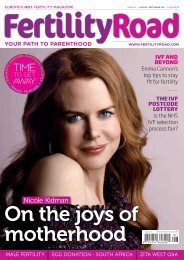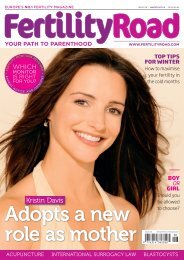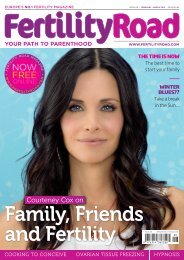Fertility Road Issue 14
You also want an ePaper? Increase the reach of your titles
YUMPU automatically turns print PDFs into web optimized ePapers that Google loves.
F E R T I L I T Y R O A D<br />
N E W S , V I E W S & R E V I E W S<br />
CELEBRITY<br />
EGG FREEZING<br />
TREND<br />
THERE’S BEEN A LOT OF GOSSIP RECENTLY ABOUT CELEBS<br />
freezing their eggs, the latest is Ghost Whisperer star, Jennifer<br />
Love Hewitt who according to US Weekly, the star is looking at<br />
preserving her fertility at the young age of 34.<br />
JLH however has since laughed off the story on Twitter by saying<br />
”I’m insuring my boobs! I’m freezing my eggs! Nope I’m just<br />
shooting the new season of The Client List ! Now that isn’t made up.”<br />
Made-up story or not, it’s not a bad idea for a busy Hollywood<br />
actress in her mid 30’s to look into freezing her eggs, particularly<br />
when money is not an issue. Freezing your eggs is no guarantee<br />
that you will able to start a family at a later date, but it does offer<br />
some insurance. And because age affects fertility, the earlier you<br />
look into freezing your eggs, the more chance you have of success.<br />
Friends star Jennifer Aniston and Maria Menounous, actress<br />
and co-host of Extra, have also been rumoured to have frozen<br />
their eggs or looked into the procedure.<br />
© ABC Studios/Bob D’Amico<br />
FOOT SIZE OFTEN<br />
GROWS DURING<br />
PREGNANCY<br />
ACCORDING TO A NEW RECENT STUDY PREGNANCY<br />
can permanently change the size and shape of women’s<br />
feet, making them up to one shoe size larger and causing<br />
the arches to drop. Researchers at University of Iowa<br />
measured the feet of 49 women during their first trimester<br />
of pregnancy and again five months after their babies were<br />
born. Roughly 60-70 % of the women’s feet grew in length<br />
and in width, primarily due to a decrease in the height of<br />
the arch of the foot, admitting that the loss of arch height<br />
appeared to be permanent and non reversible.<br />
STUDIES SUGGEST<br />
THAT SPERM ARE<br />
HEALTHIER<br />
IN WINTER<br />
& EARLY<br />
SPRING<br />
IF YOU’RE TRYING FOR A BABY,<br />
a new study suggests that it’s best<br />
to try in winter and early spring, when men have healthier sperm. Israeli<br />
scientists studied samples from more than 6,000 men who were being<br />
treated for infertility between January 2006 and July 2009. Researchers<br />
found sperm in greater numbers, with faster swimming speeds, and fewer<br />
abnormalities, in semen made during the winter. The sperm declined<br />
steadily in quality from spring onwards,<br />
In animal studies, seasonal changes in sperm production and fertility<br />
have been linked to factors ranging from temperature, to length of daylight<br />
exposure and hormone variations, previous research found that global<br />
human sperm counts are falling, with theories ranging from a more<br />
sedentary lifestyle to the chemicals in the environment affecting sperm<br />
health. Writing in the American Journal of Obstetrics & Gynaecology, the<br />
researchers said that if there is a seasonal pattern, that knowledge may<br />
‘be of paramount importance, especially in couples with male-related<br />
infertility struggling with unsuccessful and prolonged fertility treatments.’<br />
06 | WWW.FERTILITYROAD.COM | APRIL - MAY 2013



